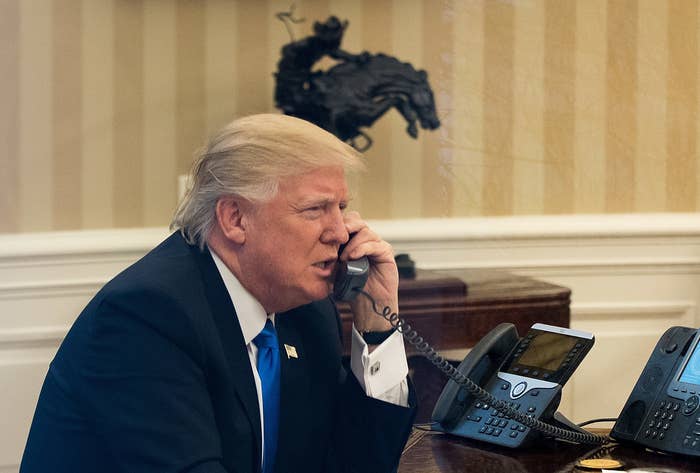
Nearly one year after the House of Representatives impeached President Donald Trump, the federal government has released the criminal referral alleging Trump committed crimes related to his phone call with Ukraine’s President Volodymyr Zelensky, a conversation that sparked the historic proceedings.
The document, obtained by BuzzFeed News from the Office of the Director of National Intelligence in response to a Freedom of Information Act lawsuit, is a letter dated September 4, 2019, and signed by Michael Atkinson, inspector general for the intelligence community. It was sent to Stacey Moy, the deputy assistant director of the FBI’s counterintelligence division. Moy’s involvement in the Ukraine matter has not been previously disclosed.
The inspector general “is formally referring allegations received from an individual regarding, among other things, alleged violations of law related to a telephone call on July 25, 2019, between President Donald J. Trump and Ukrainian President Volodymyr Zelensky,” Atkinson wrote. “This referral is a follow-up to my secure telephone call on August 27, 2019, with FBI Director Christopher A. Wray’s Chief of Staff, Paul B. Murphy, during which I provided to Mr. Murphy a summary of the Complainant’s allegations.”
On Aug. 12, 2019, an anonymous CIA officer had filed a formal whistleblower complaint with the House and Senate Intelligence committees and Atkinson, the inspector general, alleging Trump pressured Zelensky to publicly announce investigations into then-Democratic presidential frontrunner Joe Biden and his son, Hunter, while withholding $400 million in military aid to Ukraine.
"According to the Complainant's allegations, 'the President of the United States is using the power of his office to solicit interference from a foreign country in the 2020 U.S. election,' which 'includes, among other things, pressuring a foreign country to investigate one of the President's main domestic political rivals,'" Atkinson wrote.
Trump wanted Zelensky to investigate unsubstantiated claims that Biden had pressured Ukraine’s prosecutor to drop an investigation into the Ukrainian gas company Hunter sat on the board of.
Atkinson's criminal referral said he determined "there are reasonable grounds to believe" that the whistleblower's allegations against Trump "appear credible."
Atkinson also sent a copy of his letter to Brian Benczkowski, the head of the Justice Department’s criminal division, after learning that “other authorities” had also sent the office information about the whistleblower’s allegation. However, the Justice Department declined to investigate whether Trump had violated a campaign finance law that prohibits foreign contributions to US politicians.
Three weeks after Atkinson sent the letter, House Speaker Nancy Pelosi announced that the House would launch an impeachment inquiry into Trump. Following impeachment in the House, the Senate acquitted Trump on Feb. 5 on obstruction of Congress and abuse of power.
An FBI spokesperson declined to comment on the letter.
In addition to the criminal referral, the Office of the Director of National Intelligence also turned over another previously undisclosed document: a four-page letter Atkinson sent to White House counsel Pat Cipollone on Aug. 26, 2019, requesting access to all documents from the White House related to the Ukraine phone call as well as the preservation of records, stating that “intentional failure to meet the obligations may result in charges of obstruction of justice.”
Irvin McCullough, a national security analyst at the Government Accountability Project, told BuzzFeed News the document preservation letter is noteworthy because it is “extraordinarily rare for an inspector general to investigate the White House and issue document preservation holds."
“There is usually a hesitancy to go after the White House because the White House can fire you,” McCullough said.
That’s what happened to Atkinson. Trump fired him in April.
BuzzFeed News also sued the CIA, seeking a copy of the criminal referral that the agency’s top lawyer reportedly sent the Justice Department about the whistleblower’s complaint. Responding to that request, the CIA issued what is known as a Glomar response: The agency can neither confirm nor deny that such a document exists.

